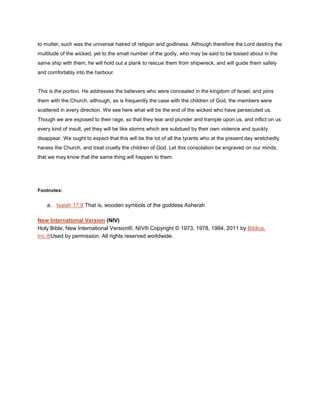This document provides commentary on Isaiah 17 from multiple scholars. It discusses the prophecy against Damascus, which foretells its destruction. Damascus and its ally Samaria (Israel) will be overcome by the Assyrians. The cities of Aroer in the land east of the Jordan will be forsaken. Both Damascus and Israel will lose their independence and power and be reduced to ruins. This prophecy was fulfilled when Tiglath-Pileser conquered Damascus and other Assyrian kings conquered Israel and parts of Aram.
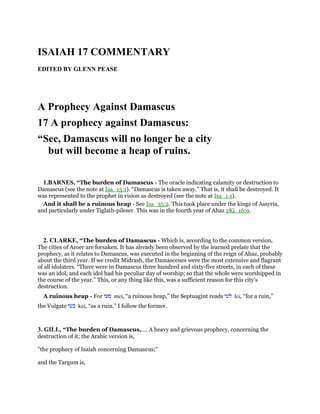
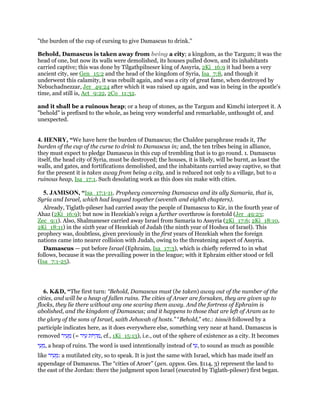
![There were two Aroers: an old Amoritish city allotted to the tribe of Reuben, viz., “Aroer on the
Arnon” (Deu_2:36; Deu_3:12, etc.); and an old Ammonitish one, allotted to the tribe of Gad,
viz., “Aroer before Rabbah” (Rabbath, Ammon, Jos_13:25). The ruins of the former are Arair,
on the lofty northern bank of the Mugib; but the situation of the latter has not yet been
determined with certainty (see Comm. on Jos_13:25). The “cities of Aroer” are these two Aroers,
and the rest of the cities similar to it on the east of the Jordan; just as “the Orions” in Isa_13:10
are Orion and other similar stars. We meet here again with a significant play upon the sound in
the expression ‛are ‛Aro‛er (cities of Aroer): the name of Aroer was ominous, and what its name
indicated would happen to the cities in its circuit. ר ֵע ְר ִע means “to lay bare,” to pull down
(Jer_51:58); and ר ָע ְר ַ,ע ריִי ִר ַע signifies a stark-naked condition, a state of desolation and solitude.
After Isa_17:1 has threatened Damascus in particular, and Isa_17:2 has done the same to Israel,
Isa_17:3 comprehends them both. Ephraim loses the fortified cities which once served it as
defences, and Damascus loses its rank as a kingdom. Those that are left of Aram, who do not fall
in the war, become like the proud citizens of the kingdom of Israel, i.e., they are carried away
into captivity. All this was fulfilled under Tiglath-pileser. The accentuation connects ם ָרፍ רፎ ְשׁ (the
remnant of Aram) with the first half of the verse; but the meaning remains the same, as the
subject to יוּ ְהִי is in any case the Aramaeans.
7. BI, “The oracle concerning Damascus and Israel
The curse pronounced upon it [Damascene-Syria] falls also upon the kingdom of Israel, because
it has allied itself with the heathen Damascus against their brethren in the south and the Davidic
kingdom.
From the reign of Hezekiah we are here carried back to the reign of Ahaz, and indeed back far
beyond the death year of Ahaz (Isa_14:28) to the boundary line of the reigns of Jotham and
Ahaz, soon after the conclusion of the league which aimed at Judah’s destruction, by which
revenge was taken for the similar league of Asa with Benhadad against Israel (1Ki_15:9). When
Isaiah incorporated this oracle in his collection, its threats against the kingdoms of Damascus
and Israel had long been fulfilled. Assyria had punished both of them, and Assyria had also been
punished, as the fourth strophe (verses 12-14) of the oracle sets forth. The oracle, therefore,
stands here on account of its universal contents, which are instructive for all time. (F. Delitzsch.)
The fall of Damascus
When cities do not pray they go down. (J. Parker, D. D.)
The loss of faculty as a judgment
It is possible for a man to moralise about the fate of a city, and forget that the principle of the
text is aimed at all life. Life poorly handled means loss of life; faculty fallen into desuetude
means faculty fallen into death. (J. Parker, D. D.)
The cities of Aroer](https://image.slidesharecdn.com/isaiah17commentary-150303115337-conversion-gate01/85/Isaiah-17-commentary-3-320.jpg)







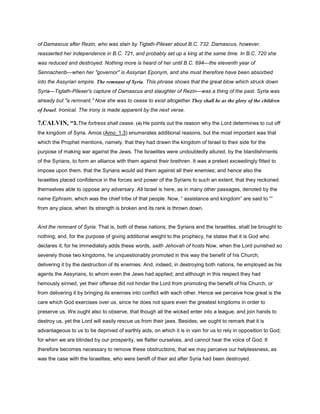



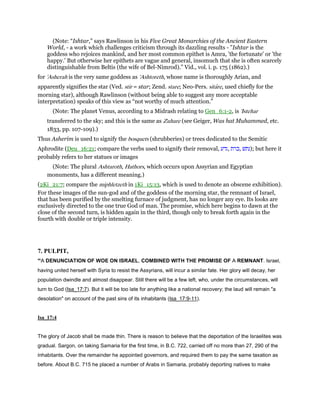

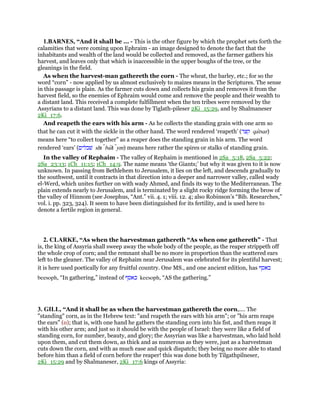



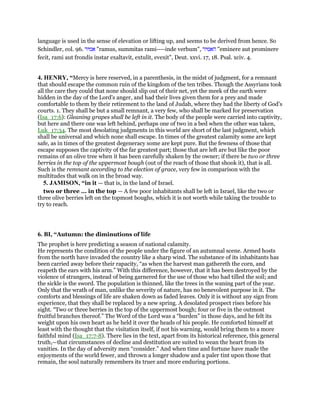




![every kind of wickedness but because they forget God? Where the knowledge of God exists, there
reverence dwells; where forgetfulness of God is found, there contempt of him also prevails. Yet this
relates properly to faith, as if he had said, “ chastisements so severe shall have tamed the Israelites, they
will then perceive that there is no help for them but in God.” For this reason he immediately adds the
expression, To his Maker. It was indeed a proof of abominable indolence that they did not rely on God
alone, who had bestowed on them so many precious gifts. The Prophet therefore says, that when they
had been subdued by distresses and afflictions, they would afterwards return to a sound mind, so as to
begin to hope in him who had bound them to himself by so many acts of kindness. And indeed he calls
God their Maker, not as having created the whole human race, but in the same sense in which he
likewise calls him The Holy One of Israel. Although therefore all men were created after the image of
God, (Gen_1:27), yet Israel was peculiarly his workmanship, because he was his heritage, and his holy
and chosen people (Exo_19:6). This repetition, in accordance with the ordinary custom of the Hebrew
language, is employed to denote the same thing. He therefore calls God Holy, not only as viewed in
himself, but from the effect produced, because he has sanctified or separated to himself the children of
Abraham. Hence it follows, that the creation which he speaks of must be understood to relate to spiritual
reformation, in reference to which he is especially called the Maker of Israel (Isa_45:11; Hos_8:14).
8
They will not look to the altars,
the work of their hands,
and they will have no regard for the Asherah poles[a]
and the incense altars their fingers have made.
1.BARNES, “And he shall not look to the altars - That is, the altars of the gods which
the Syrians worshipped, and the altars of the false gods which had been erected in the land of
Israel or Samaria by its wicked kings, and particularly by Ahaz. Ahaz fancied an altar which he
saw at Damascus when on a visit to Tiglath-pileser, and ordered Urijah the priest to construct
one like it in Samaria, on which he subsequently offered sacrifice 2Ki_16:10-13. It is well known,
also, that the kings of Israel and Judah often reared altars to false gods in the high places and
the groves of the land (see 2Ki_21:3-5). The Ephraimites were particularly guilty in this respect
Hos_8:11 : ‘Because Ephraim hath made many altars to sin, altars shall be unto him to sin.’
Which his fingers have made - Perhaps indicating that the idols which they worshipped
had been constructed with special art and skill (see Isa_2:8).](https://image.slidesharecdn.com/isaiah17commentary-150303115337-conversion-gate01/85/Isaiah-17-commentary-26-320.jpg)
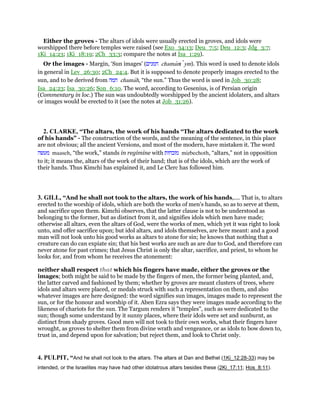





![being forsaken of their inhabitants, when the Romans besieged Jerusalem, and made the land
desolate; which calamity came upon them, for their neglect and forgetfulness of Jesus the
Saviour.
4. HENRY, “Here the prophet returns to foretel the woeful desolations that should be made in
the land of Israel by the army of the Assyrians. 1. That the cities should be deserted. Even the
strong cities, which should have protected the country, shall not be able to protect themselves:
They shall be as a forsaken bough and an uppermost branch of an old tree, which has gone to
decay, is forsaken of its leaves, and appears on the top of the tree, bare, and dry, and dead; so
shall their strong cities look when the inhabitants have deserted them and the victorious army of
the enemy pillaged and defaced them, Isa_17:9. They shall be as the cities (so it may be
supplied) which the Canaanites left, the old inhabitants of the land, because of the children of
Israel, when God brought them in with a high hand, to take possession of that good land, cities
which they built not. As the Canaanites then fled before Israel, so Israel should now flee before
the Assyrians. And herein the word of God was fulfilled, that, if they committed the same
abominations, the land should spue them out, as it spued out the nations that were before them
(Lev_18:28), and that as, while they had God on their side, one of them chased a thousand, so,
when they had made him their enemy, a thousand of them should flee at the rebuke of one; so
that in the cities should be desolation, according to the threatenings in the law, Lev_26:31;
Deu_28:51.
5. JAMISON, “forsaken bough — rather “the leavings of woods,” what the axeman leaves
when he cuts down the grove (compare Isa_17:6).
which they left because of — rather, “which (the enemies) shall leave for the children of
Israel”; literally, “shall leave (in departing) from before the face of the children of Israel”
[Maurer]. But a few cities out of many shall be left to Israel, by the purpose of God, executed by
the Assyrian.
6. K&D, “Third turn: “In that day will his fortified cities be like the ruins of the forest and of
the mountain top, which they cleared before the sons of Israel: and there arises a waste place.
For thou hast forgotten the God of thy salvation, and hast not thought of the Rock of thy
stronghold, therefore thou plantedst charming plantations, and didst set them with strange
vines. In the day that thou plantedst, thou didst make a fence; and with the morning dawn
thou madest thy sowing to blossom: a harvest heap in the day of deep wounds and deadly
sorrow of heart.” The statement in Isa_17:3, “The fortress of Ephraim is abolished,” is repeated
in Isa_17:9 in a more descriptive manner. The fate of the strongly fortified cities of Ephraim
would be the same as that of the old Canaanitish castles, which were still to be discerned in their
antiquated remains, either in the depths of forests or high up on the mountains. The word ‛azuba
h, which the early translators quite misunderstood, signifies, both here and in Isa_6:12, desolate](https://image.slidesharecdn.com/isaiah17commentary-150303115337-conversion-gate01/85/Isaiah-17-commentary-33-320.jpg)
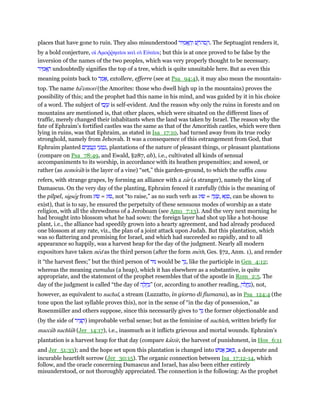

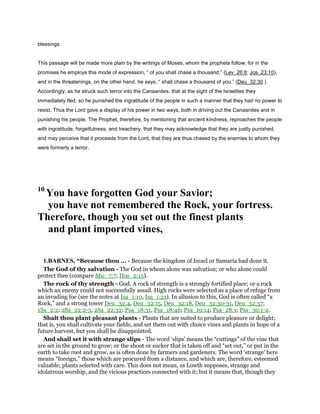
![should be at great pains and expense in cultivating their land, yet the enemy would come in and
make it desolate.
2. CLARKE, “Strange slips “Shoots from a foreign soil” - The pleasant plants, and
shoots from a foreign soil, are allegorical expressions for strange and idolatrous worship; vicious
and abominable practices connected with it; reliance on human aid, and on alliances entered
into with the neighboring nations, especially Egypt; to all which the Israelites were greatly
addicted, and in their expectations from which they should be grievously disappointed.
3. GILL, “Because thou hast forgotten the God of thy salvation,.... Who had been the
author of salvation to them many a time, in Egypt, at the Red Sea, and in various instances
since; and yet they had forgot his works of mercy and goodness, and had left his worship, and
gone after idols; and this was the cause of their cities being forsaken, and becoming a desolation:
and hast not been mindful of the rock of thy strength; or strong Rock, who had supplied
and supported them, protected and defended them:
therefore shalt thou plant pleasant plants; or "plants of pleasant fruit" (s), or "plants of
Naamanim"; and so Aben Ezra takes it to be the proper name of a plant in the Arabic language,
and which he says is a plant that grows very quick; perhaps he means "Anemone", which is so
called in that language (t), and is near to it in sound; though rather, not any particular plant is
meant, but all sorts of pleasant plants, flowers, and fruit trees, with which the land of Israel
abounded:
and shall set it with strange slips; with foreign ones, such as are brought from other
countries, and are scarce and dear, and highly valued; and by "plants" and "slips" may be meant
false and foreign doctrines, inculcating idolatry and superstition, which are pleasing to the flesh
(u).
4. HENRY, “That the country should be laid waste, Isa_17:10, Isa_17:11. Observe here, (1.) The
sin that had provoked God to bring so great a destruction upon that pleasant land. It was for the
iniquity of those that dwelt therein. “It is because thou hast forgotten the God of thy salvation
and all the great salvations he has wrought for thee, hast forgotten thy dependence upon him
and obligations to him, and hast not been mindful of the rock of thy strength, not only who is
himself a strong rock, but who has been thy strength many a time, or thou wouldst have been
sunk and broken long since.” Note, The God of our salvation is the rock of our strength; and our
forgetfulness and unmindfulness of him are at the bottom of all sin. Therefore have we
perverted our way, because we have forgotten the Lord our God, and so we undo ourselves.
(2.) The destruction itself, aggravated by the great care they took to improve their land and to
make it yet more pleasant. [1.] Look upon it at the time of the seedness, and it was all like a
garden and a vineyard; that pleasant land was replenished with pleasant plants, the choicest of
its own growth; nay, so nice and curious were the inhabitants that, not content with them, they
sent to all the neighbouring countries for strange slips, the more valuable for being strange,
uncommon, far-fetched, and dear-bought, though perhaps they had of their own not inferior to](https://image.slidesharecdn.com/isaiah17commentary-150303115337-conversion-gate01/85/Isaiah-17-commentary-37-320.jpg)
![them. This was an instance of their pride and vanity, and (that ruining error) their affection to
be like the nations. Wheat, and honey, and oil were their staple commodities (Eze_27:17); but,
not content with these, they must have flowers and greens with strange names imported from
other nations, and a great deal of care and pains must be taken by hot-beds to make these plants
to grow; the soil must be forced, and they must be covered with glasses to shelter them, and
early in the morning the gardeners must be up to make the seed to flourish, that it may excel
those of their neighbours. The ornaments of nature are not to be altogether slighted, but it is a
folly to be over-fond of them, and to bestow more time, and cost, and pains about them than
they deserve, as many do. But here this instance seems to be put in general for their great
industry in cultivating their ground, and their expectations from it accordingly; they doubt not
but their plants will grow and flourish. But, [2.] Look upon the same ground at the time of
harvest, and it is all like a wilderness, a dismal melancholy place, even to the spectators, much
more to the owners; for the harvest shall be a heap, all in confusion, in the day of grief and of
desperate sorrow. The harvest used to be a time of joy, of singing and shouting (Isa_16:10); but
this harvest the hungry eat up (Job_5:5), which makes it a day of grief, and the more because
the plants were pleasant and costly (Isa_17:10) and their expectations proportionably raised.
The harvest had sometimes been a day of grief, if the crop was thin and the weather
unseasonable; and yet in that case there was hope that the next would be better. But this shall be
desperate sorrow, for they shall see not only this year's products carried off, but the property of
the ground altered and their conquerors lords of it. The margin reads it, The harvest shall be
removed (into the enemy's country or camp, Deu_28:33) in the day of inheritance (when thou
thoughtest to inherit it), and there shall be deadly sorrow. This is a good reason why we should
not lay up our treasure in those things which we may so quickly be despoiled of, but in that good
part which shall never be taken away from us.
5. JAMISON, “forgotten ... God of ... salvation ... rock — (Deu_32:15, Deu_32:18).
plants — rather, “nursery grounds,” “pleasure-grounds” [Maurer].
set in — rather, “set them,” the pleasure-grounds.
strange slips — cuttings of plants from far, and therefore valuable.
6. BI, “Forgetfulness of God punished
I. THE MAGNITUDE OF THE SIN HERE SPOKEN OF. Forgetfulness of God.
1. What is this forgetfulness of God? It has been defined as “such a habitual inattention to
His existence and character, as leads the individual under its influence to a mode of
thinking, feeling, and acting, which would be consistent only on the supposition that there
were no God, or that God is a very different Being from what the Scriptures represent Him to
be.”
2. It is a startling sin. Everything around us is designed and fitted to remind us of God. The
Bible unfolds the moral character of God. Sharp dispensations of providence remind us of
His existence. Preachers enforce His claims. Each returning Sabbath, with its closed
shutters, the sound of the church going bell, and the voice of praise from the lips of the
pious, says, Worship God. But many would rather think about anything, or nothing, than
about God.](https://image.slidesharecdn.com/isaiah17commentary-150303115337-conversion-gate01/85/Isaiah-17-commentary-38-320.jpg)


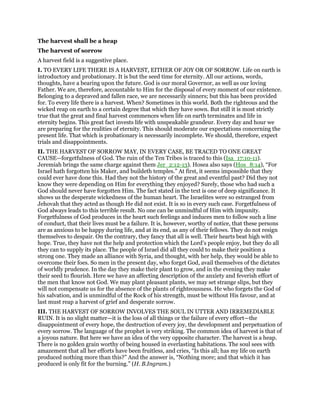






![carefully fenced, i.e. apparently they were established as a state religion. "And the very next morning he
had brought into blossom what he had sown. The foreign layer had shot up like a hot-house plant, i.e. the
alliance had speedily grown into a hearty agreement, and had already produced one blossom at any rate,
viz. the plan of a joint attack upon Judah. But this plantation, so flattering and promising for Israel, and
which had succeeded so rapidly, and to all appearance so happily, was a harvest heap for the day of
judgment." The closing words of this strophe are impressive: "The day of grief and desperate sorrow;" or,
"The day of deep wounds and deadly sorrow of heat." Let us fix on these words. Let us forget Ephraim for
the moment, and think of the individual, think of ourselves. The words hint at remorse, which has been
called "the echo of a lost virtue." It will come upon all of us in so far as, remembering many things not to
be neglected, self-interest, duty to family, Church, country, we have yet forgotten the one thing needful—
have not brought all our life's concerns into that unity which reference to the Supreme Will imparts. Life
should be direct and simple; a simple piety can only render it so. There may be mindfulness about many
things, distracting us from the central interest. How can it avail us to have remembered to be prudent, to
have regarded public opinion, to have taken care to be with the majority, to swim with the stream, and in
the end we find that this has been a turning of the back on God, and so an illusion, a misconception of
life? For if God be remembered, nothing important will be forgotten; if he be forgotten, nothing is truly
seen—attention is beguiled by fantasy, and life becomes the pursuit of a dream.—J.
5. JAMISON, “In the day ... thy plant — rather, “In the day of thy planting” [Horsley].
shalt ... make ... grow — Maurer translates, “Thou didst fence it,” namely, the pleasure-
ground. The parallel clause, “Make ... flourish,” favors English Version. As soon as thou plantest,
it grows.
in the morning — that is, immediately after; so in Psa_90:14, the Hebrew, “in the
morning,” is translated “early.”
but ... shall be a heap — rather, “but (promising as was the prospect) the harvest is gone”
[Horsley].
in ... day of grief — rather, “in the day of (expected) possession” [Maurer]. “In the day of
inundation” [Horsley].
of desperate sorrow — rather, “And the sorrow shall be desperate or irremediable.” In
English Version “heap” and “sorrow” may be taken together by hendiadys. “The heap of the
harvest shall be desperate sorrow” [Rosenmuller].
6. PULPIT, “The sin and doom of ungodliness.
We learn—
I. THAT GOD IS WRONGED AND GRIEVED BY OUR NEGLECT OF HIMSELF AS WELL AS BY OUR](https://image.slidesharecdn.com/isaiah17commentary-150303115337-conversion-gate01/85/Isaiah-17-commentary-48-320.jpg)
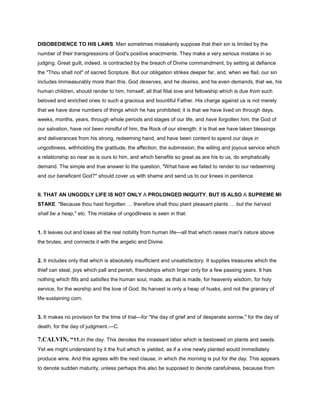



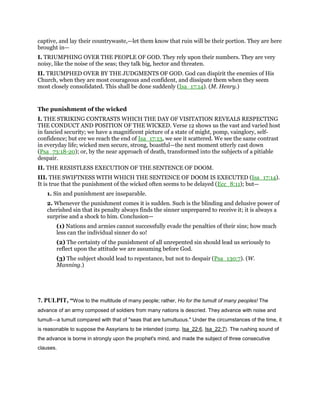




![Before the morning, they are gone!
This is the portion of those who loot us,
the lot of those who plunder us.
1.BARNES, “At evening-tide trouble - In the time of evening - that is, in the night.
Before the morning he is not - That is, he is destroyed. This is strikingly descriptive of the
destruction of the army of Sennacherib on that fatal night when the angel of the Lord killed
185,000 men (see the note at Isa_37:36).
This is the portion of them that spoil us - Of those who would plunder us. This is a
“general” declaration in regard to the enemies of the Jewish people. This is the lot, the end, the
destiny of all who attempt to destroy them. That is, the people of God shall be safe whoever rises
up against them; and whatever may be the number, or the power of their foes, they shall be
overthrown.
2. CLARKE, “He is not “He is no more” - For איננו einennu ten MSS. of Dr. Kennicott’s,
(three ancient), ten of De Rossi’s, and two editions, and the Septuagint, Syriac, Chaldee, Vulgate,
and Arabic, have ואיננו veeinenno. This particle, authenticated by so many good vouchers,
restores the sentence to its true poetical form, implying a repetition of some part of the parallel
line preceding, thus: -
“At the season of evening, behold terror!
Before the morning, and [behold] he is no more!”
That spoil us - For שוסינו shoseynu, them that spoil us, fifteen MSS., one edition, and the
Syriac have שוסנו shosenu, him that spoileth us. And for לבזזינו lebozezeynu, them that rob us, six
MSS. and the Syriac have לבוזזנו lebozzeno, him that robbeth us: and these readings make the
place answer better to Sennacherib, according to Lowth’s conjecture. Though God may permit
the wicked to prevail for a time against his people, yet in the end those shall be overthrown, and
the glory of the Lord shall shine brightly on them that fear him; for the earth shall be subdued,
and the universe filled with his glory. Amen, and Amen!
3. GILL, “And behold at eveningtide trouble,.... Or terror (a) and consternation; which
some understand of that which was in the Assyrian army, when the Angel of the Lord destroyed
it, taking "evening for night", for it was in the night that that was done; so Jarchi interprets it of
Shedim, a sort of spirits or demons, that came against the enemy, and troubled and frightened
them: but it is best to take it in the more common sense, of the trouble that Hezekiah and the
inhabitants of Jerusalem were in, on the evening or night before their deliverance; the whole](https://image.slidesharecdn.com/isaiah17commentary-150303115337-conversion-gate01/85/Isaiah-17-commentary-58-320.jpg)


